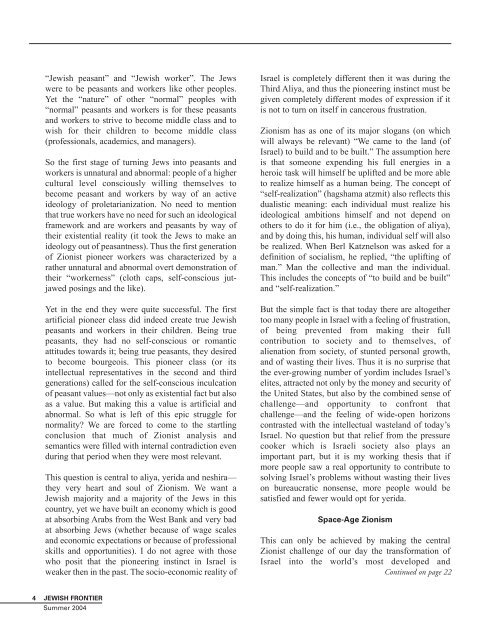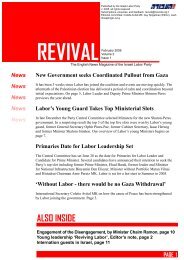Create successful ePaper yourself
Turn your PDF publications into a flip-book with our unique Google optimized e-Paper software.
“Jewish peasant” and “Jewish worker”. The Jews<br />
were to be peasants and workers like other peoples.<br />
Yet the “nature” of other “normal” peoples with<br />
“normal” peasants and workers is for these peasants<br />
and workers to strive to become middle class and to<br />
wish for their children to become middle class<br />
(professionals, academics, and managers).<br />
So the first stage of turning Jews into peasants and<br />
workers is unnatural and abnormal: people of a higher<br />
cultural level consciously willing themselves to<br />
become peasant and workers by way of an active<br />
ideology of proletarianization. No need to mention<br />
that true workers have no need for such an ideological<br />
framework and are workers and peasants by way of<br />
their existential reality (it took the Jews to make an<br />
ideology out of peasantness). Thus the first generation<br />
of Zionist pioneer workers was characterized by a<br />
rather unnatural and abnormal overt demonstration of<br />
their “workerness” (cloth caps, self-conscious jutjawed<br />
posings and the like).<br />
Yet in the end they were quite successful. The first<br />
artificial pioneer class did indeed create true Jewish<br />
peasants and workers in their children. Being true<br />
peasants, they had no self-conscious or romantic<br />
attitudes towards it; being true peasants, they desired<br />
to become bourgeois. This pioneer class (or its<br />
intellectual representatives in the second and third<br />
generations) called for the self-conscious inculcation<br />
of peasant values—not only as existential fact but also<br />
as a value. But making this a value is artificial and<br />
abnormal. So what is left of this epic struggle for<br />
normality We are forced to come to the startling<br />
conclusion that much of Zionist analysis and<br />
semantics were filled with internal contradiction even<br />
during that period when they were most relevant.<br />
This question is central to aliya, yerida and neshira—<br />
they very heart and soul of Zionism. We want a<br />
Jewish majority and a majority of the Jews in this<br />
country, yet we have built an economy which is good<br />
at absorbing Arabs from the West Bank and very bad<br />
at absorbing Jews (whether because of wage scales<br />
and economic expectations or because of professional<br />
skills and opportunities). I do not agree with those<br />
who posit that the pioneering instinct in Israel is<br />
weaker then in the past. The socio-economic reality of<br />
Israel is completely different then it was during the<br />
Third Aliya, and thus the pioneering instinct must be<br />
given completely different modes of expression if it<br />
is not to turn on itself in cancerous frustration.<br />
Zionism has as one of its major slogans (on which<br />
will always be relevant) “We came to the land (of<br />
Israel) to build and to be built.” The assumption here<br />
is that someone expending his full energies in a<br />
heroic task will himself be uplifted and be more able<br />
to realize himself as a human being. The concept of<br />
“self-realization” (hagshama atzmit) also reflects this<br />
dualistic meaning: each individual must realize his<br />
ideological ambitions himself and not depend on<br />
others to do it for him (i.e., the obligation of aliya),<br />
and by doing this, his human, individual self will also<br />
be realized. When Berl Katznelson was asked for a<br />
definition of socialism, he replied, “the uplifting of<br />
man.” Man the collective and man the individual.<br />
This includes the concepts of “to build and be built”<br />
and “self-realization.”<br />
But the simple fact is that today there are altogether<br />
too many people in Israel with a feeling of frustration,<br />
of being prevented from making their full<br />
contribution to society and to themselves, of<br />
alienation from society, of stunted personal growth,<br />
and of wasting their lives. Thus it is no surprise that<br />
the ever-growing number of yordim includes Israel’s<br />
elites, attracted not only by the money and security of<br />
the United States, but also by the combined sense of<br />
challenge—and opportunity to confront that<br />
challenge—and the feeling of wide-open horizons<br />
contrasted with the intellectual wasteland of today’s<br />
Israel. No question but that relief from the pressure<br />
cooker which is Israeli society also plays an<br />
important part, but it is my working thesis that if<br />
more people saw a real opportunity to contribute to<br />
solving Israel’s problems without wasting their lives<br />
on bureaucratic nonsense, more people would be<br />
satisfied and fewer would opt for yerida.<br />
Space-Age Zionism<br />
This can only be achieved by making the central<br />
Zionist challenge of our day the transformation of<br />
Israel into the world’s most developed and<br />
Continued on page 22<br />
4 JEWISH FRONTIER<br />
Summer 2004




